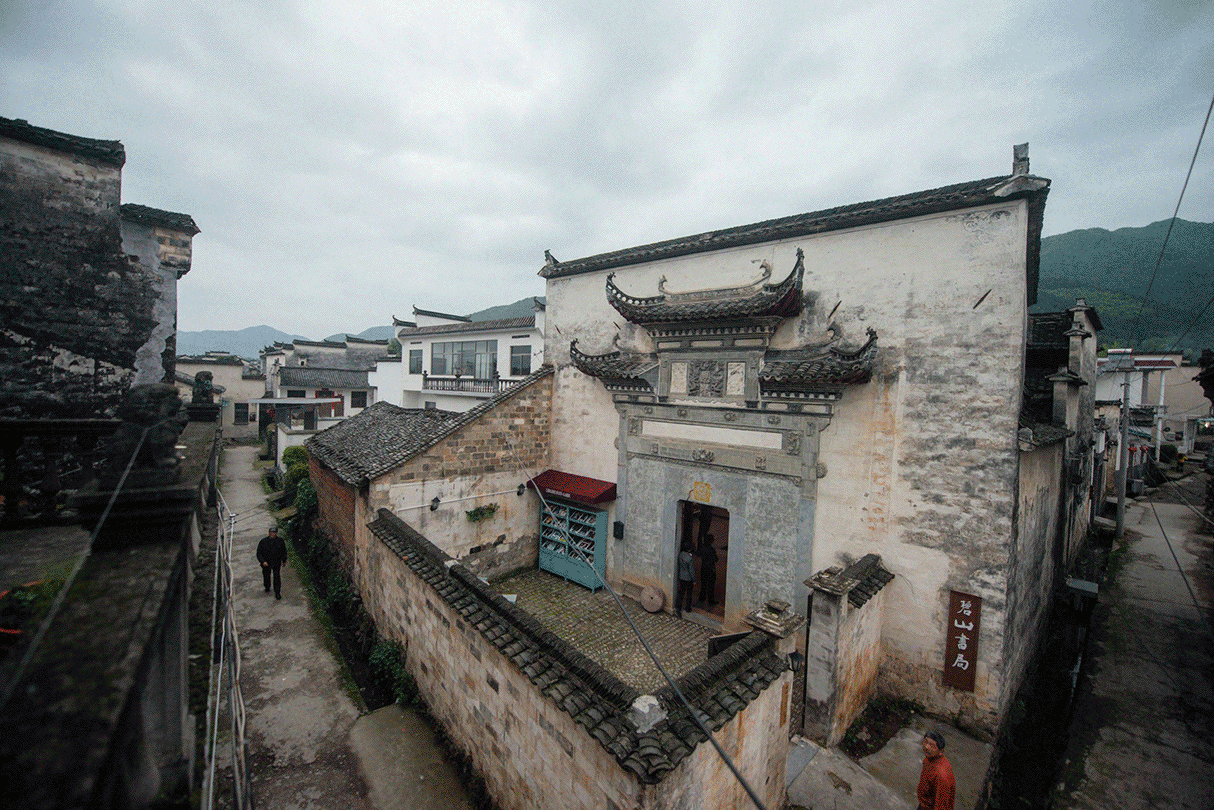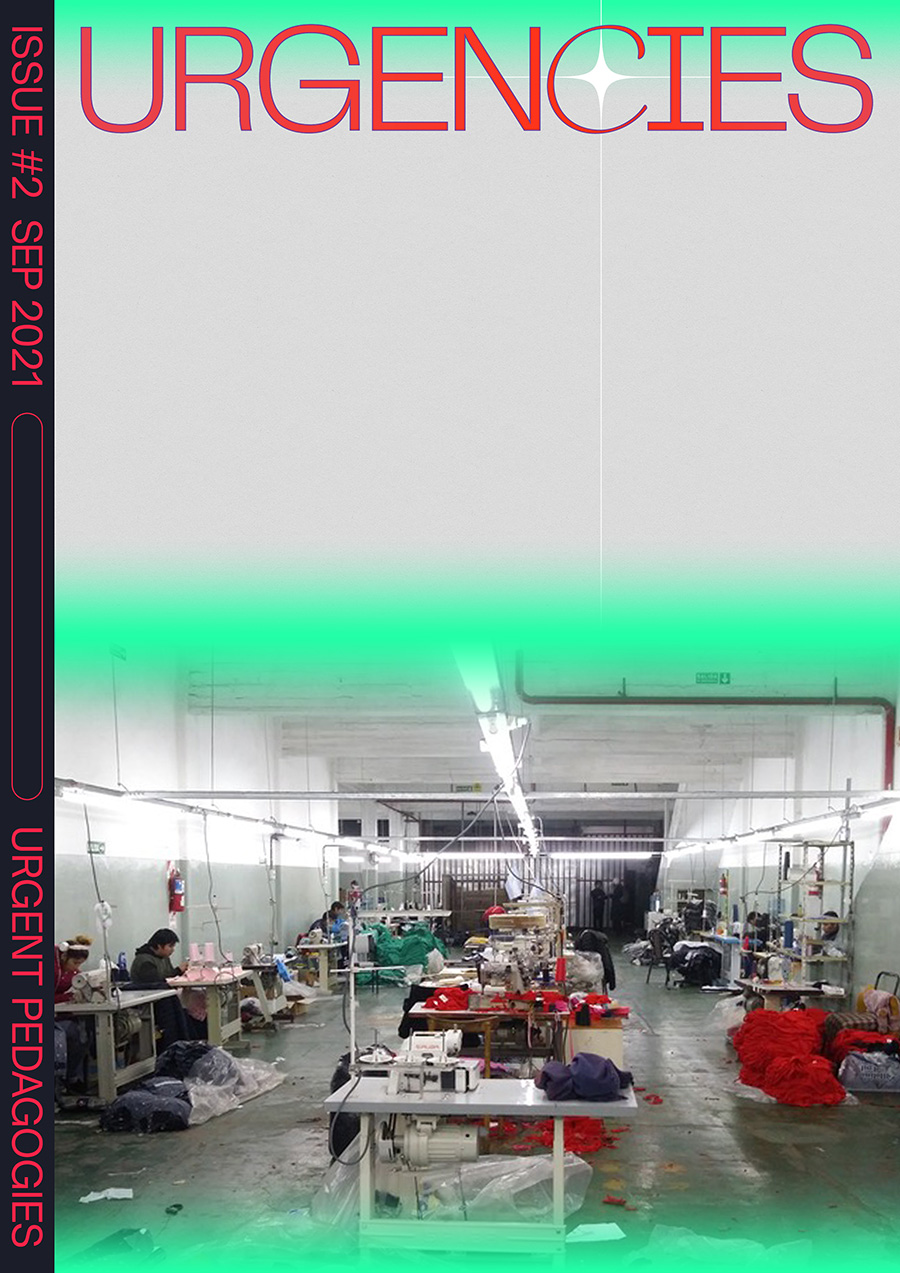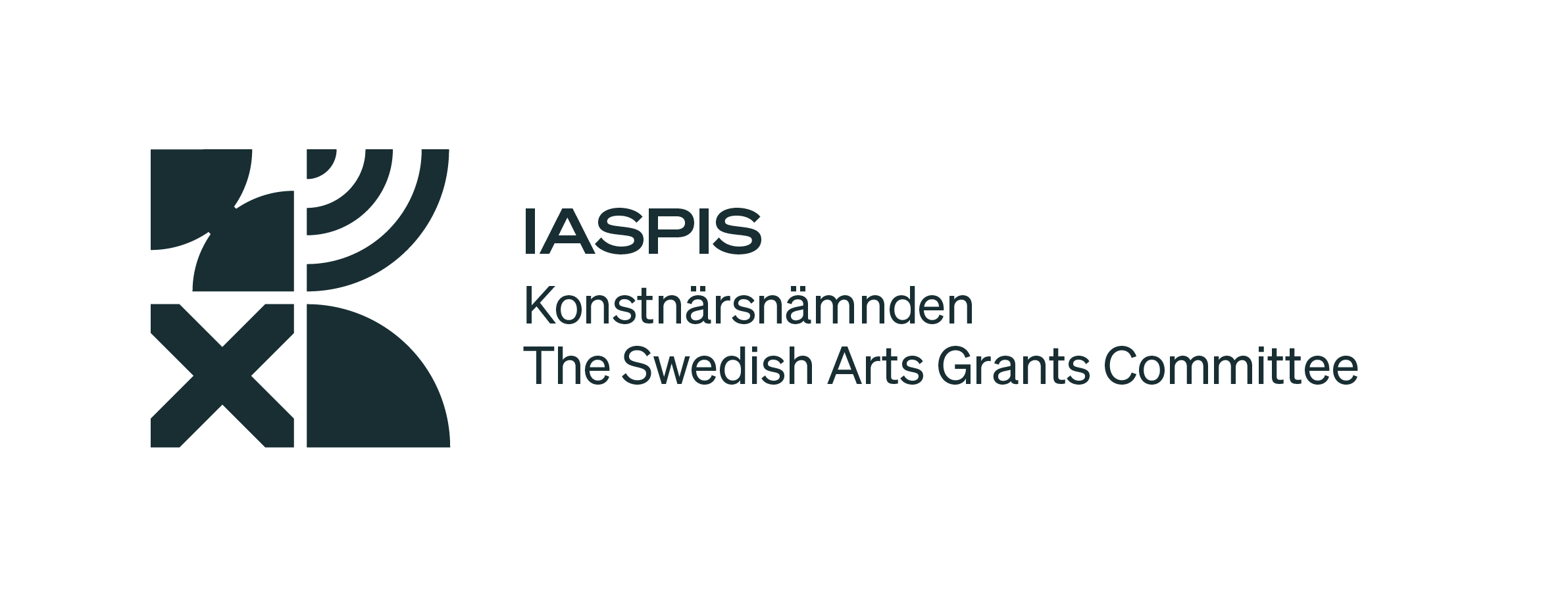The laboratory of the continuous crisis
Mauricio Corbalán and Pio Torroja, m7red
CATEGORY
“The laboratory produces concepts that are not offered as definitive solutions. Rather, they are designed to move the inquiry still further, for an ongoing exploration of the political problems posed by precariousness and exclusion.“
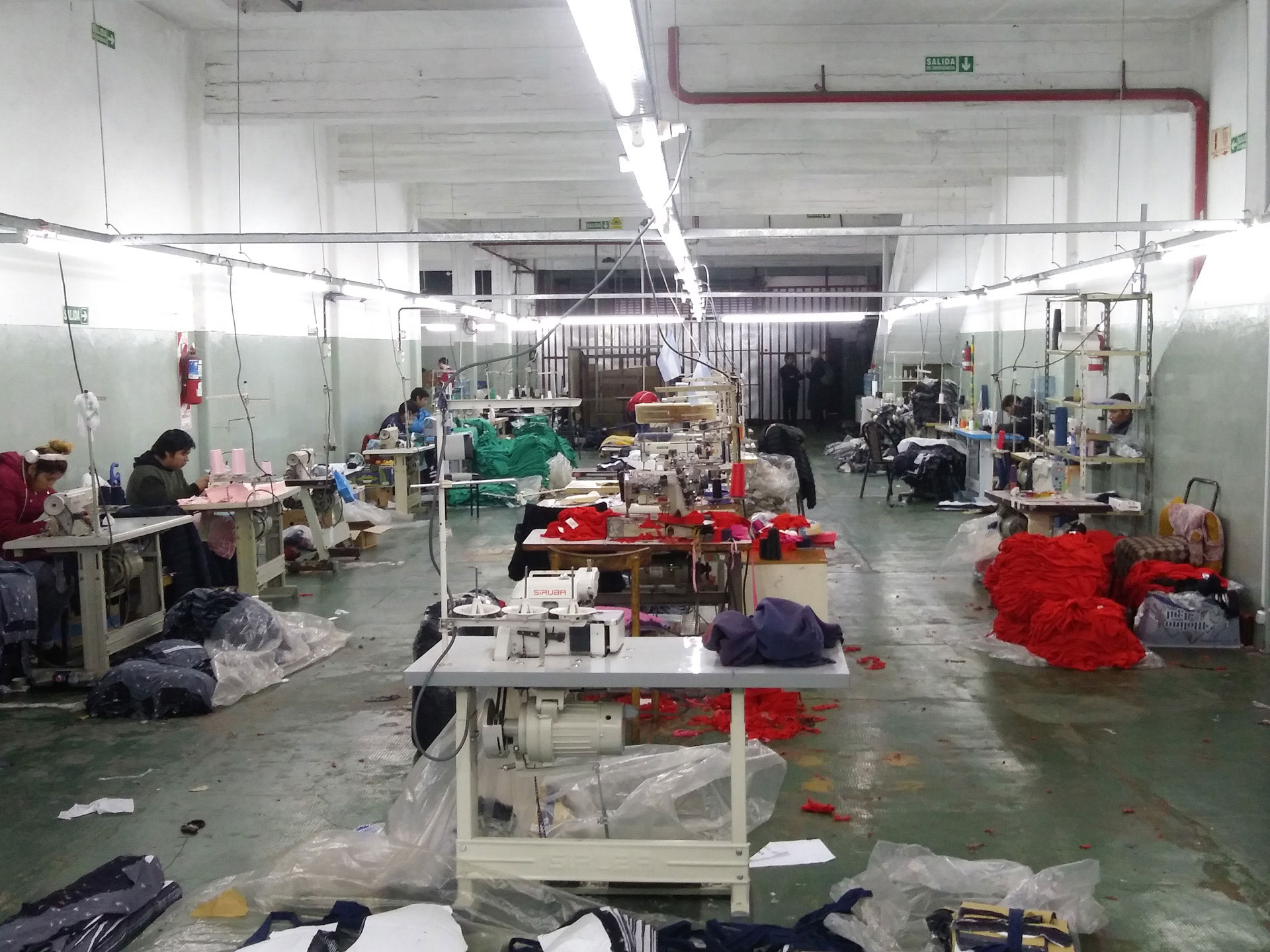
Centro productivo de indumentaria y de integración comunitaria, located in the south area of Buenos Aires. One node of the “Polos Textiles” network created by the MTE. Photo by m7red.
“It seems symptomatic to me that in order to solve a complex problem that has a community-based solution, environmentally correct and feasible, technocratic thinking and big business approach is used instead.”
Juan Grabois, national referent of the MTE.
Since the eruption of the financial crisis in Argentina 2001 there has been a sharp increase of protest actions in terms of numbers, scale and militancy, both in urban and in rural areas. From its origins at a neglected neighborhood of central Buenos Aires amidst the fierce of the financial crisis of 2001, the MTE -Movimiento de Trabajadores Excluidos- (Movement of excluded workers) together with hundreds of other organizations across the country (CTEP, CCC, Polo Obrero, Via Campesina, etc) has grown in a territorial movement that organizes the daily activities of almost 5 million people. Using the institutional format of a worker’s union, the MTE has promoted the self-organization of working collectives in urban and rural areas aiming at the continuous development of political awareness and better living conditions for all of their members.
The Movimiento de Trabajadores Excluidos (MTE) –Movement of excluded workers– has been, since its origins, collectively founded and organized by those excluded from the formal economy. This concept of exclusion, generalized by globalization in the last decades, is what we are interested in because we see it, not as a flaw to the system, but as a default condition “by design” from which we need to start to think of as a generalized transformation: embodied by those living outside job markets, the precariat, the coming Universal Basic Income or any other scheme emerging from the rapidly fading out of the salary model.
These people are excluded from labor, yes, but they are the invisible subjects inhabiting the core of conflictive urban and rural scenarios that reverberates across the whole of Argentine society. In fact, the MTE came into existence through conflicts with local police, urban developers and city governments. Two examples of criminalized or invisible activities but crucial to rethink life support systems were garbage pickers in the streets (the “cartoneros” cardboard recyclers) and agro-ecological farmers at the borders of the city. The garbage picking activities or informal recyclers were criminalized by the police and the wealthy city dwellers but because of their organization through the MTE, they evolved into a system of self-managed cooperatives doing the recycling at the end of the supply chain of the packaging industry and became recognized experts when the city government’s officials together with the Mayor of Buenos Aires wanted to introduce waste to burn technologies of trash recycling. The other example are the migrant workers and their families producing food at the fringes of rural urban areas. These workers fulfill the daily needs for vegetables of almost the whole population of the metropolitan area of Buenos Aires (15 million people) thus they are kept marginalized in their small rented farms, resisting the pressures of urban developers that want to change land uses of those territories to expel them. By means of the rural branch of the MTE first they organized themselves and crossed the gap between the rural and the urban by -literally- assaulting central public spaces of Buenos Aires with strikes and installing “free vegetable markets” called “feriazos” where they sold their produce. After that initial disruption they developed an entire logistical system that helped to bring regularly agro-ecological produce into the heart of the city by creating a network of suppliers and promoters of a healthy diet to the urbanites besieged by supermarket chains and unhealthy food.
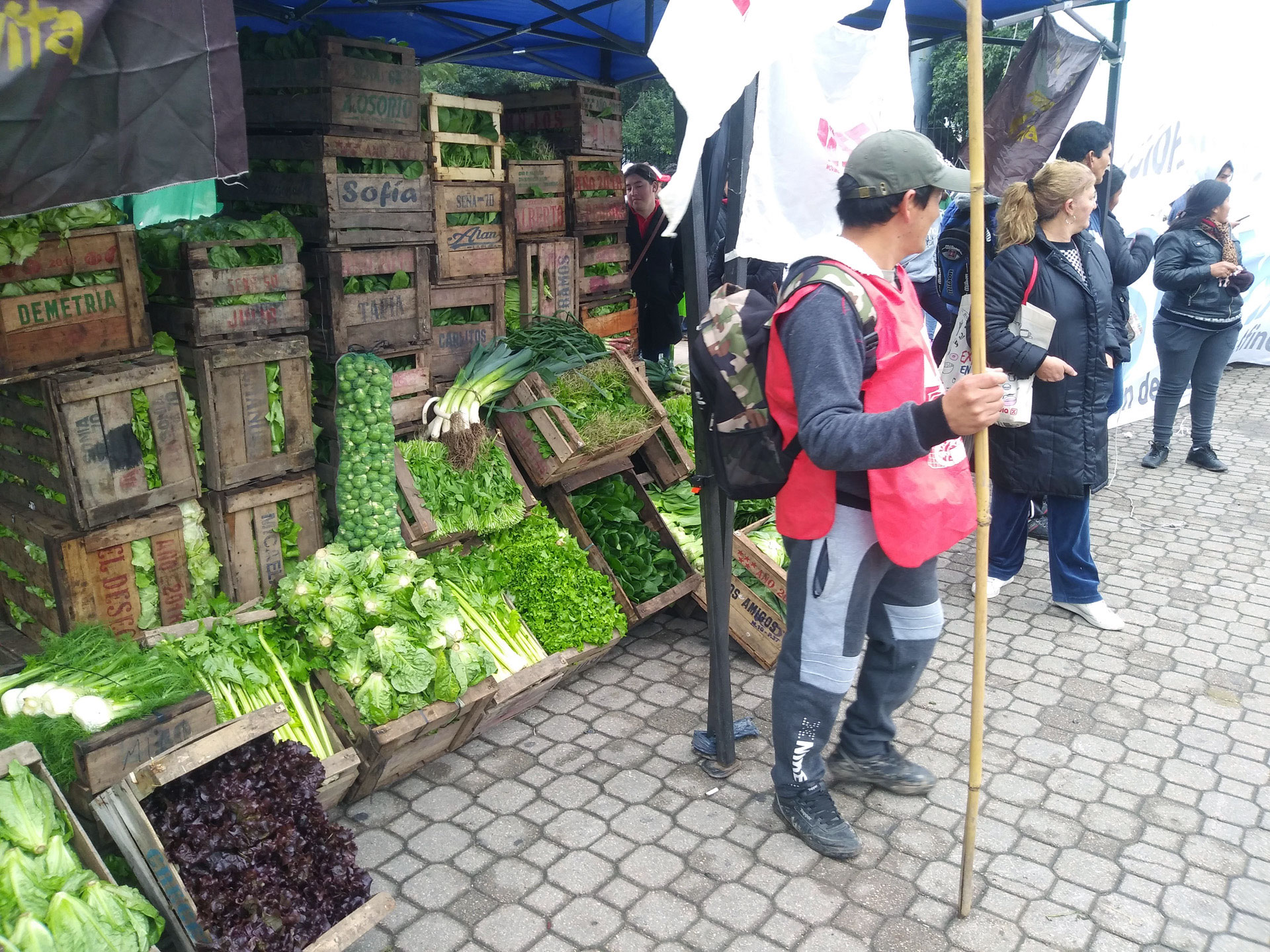
“Free for all agroecological produce”, demonstration organized by the MTE rural branch at the gates of the SRA (Sociedad Rural Argentina) annual agricultural and cattle exhibition in Buenos Aires. Photo by m7red
In 2018 we created the “Laboratorio de Tecnología y Territorio” as an open space in constant transformation to follow up these activities and reflect on them and to propose together new ways of producing spatial knowledge. Invention of work is in fact the main activity of all the eleven branches of the MTE (social infrastructure and construction, migrant street vendors, youth, women, health, education, rural, garment, etc).
We started with a couple of strategic branches: street vendors (most of them of Senegalese origin) that were recently evicted from the streets in an unprecedented repressive action aimed to regenerate a whole neighborhood at the city center of Buenos Aires. The city government wanted to transform a neglected (but central) area of Buenos Aires in order to make it a blueprint for further developments. They called this taking over of the neighborhood – by means of segregation of activities – an “urban laboratory”. That’s why our laboratory is mirroring this but taking the organization of the labor disenfranchised (the urban poor) as the central subject that makes possible to rethink the neighborhood from the bottom to the top, and to think the city again not only as a place for living and working, but as a territory – an oikology – beyond the cycles of boom and bust: degradation, real estate investment and gentrification. Time to rethink the entire life support system, so look at those who are doing it. Two of these collectives were born from the struggles to organize themselves in order to create an economy, their own economy, beyond mere subsistence. Each of these groups of excluded are formalized as branches of a union, like guilds, related to the activity that gave origin to the group. These activities were not urban services to be fulfilled, they arose through harsh conflicts with government, real estate, brutal police forces and reluctant social acceptance.
The other branch we paid attention to – because it was in a process of scaling up its operation – was the textile branch. They were setting up a network of “polos textiles”, which is a spatial reorganization to tackle slave work in the garment industry. The polos textiles are strategies to organize the work of independent sewers that work “a façon” at home in precarious conditions. The risk of electrical blazes due to poor electrical installations led in the last years to many deaths by fire. Most of this industry is occupied by migrants from Bolivia living in harsh working regimes bordering slavery. Observing this, the MTE textile encouraged workers to take work out from their homes to create “polos”, rented spaces-workshops with good safety conditions where they could eventually form cooperatives in order to take orders, distribute production quotas and take care of their children in self organized kindergartens. The lab was asked to develop a mobile phone application to deal with the production scheme of the polos and to organize them as a social network to monitor production and keep political awareness of their working conquests.
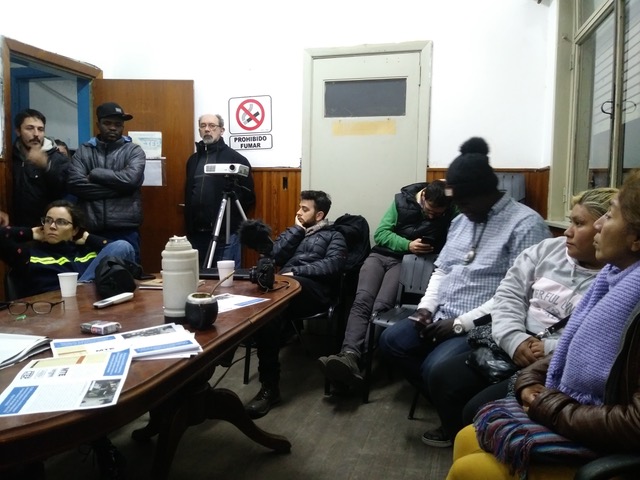
Meeting of the laboratory at the MTE headquarters with street vendors of senegalese origin displaced by the Buenos Aires city government. Photo by m7red.
Through the practices of these collectives like the MTE and others, neighborhoods, cities and their metropolitan areas could be seen as oikology, territories as processes of continuous transformation where knowledge is derived from the same conditions of inhabiting them. Territorial knowledge is created by inhabiting a territory and dealing with it by how to organize livelihood. The laboratory recognizes this condition as the primary source of continuous knowledge production. The territorial lab at the MTE is a process of continuous formation weaving between reflection and experimentation of those unrecognized activities that shapes our territories but going beyond resistance into organization of labor and knowledge.
The laboratory aims to create new concepts from observing carefully the daily initiatives of the MTE. The laboratory produces concepts that are not offered as definitive solutions. Rather, they are designed to move the inquiry further, for an ongoing exploration of the political problems posed by precariousness and exclusion. These concepts are then gradually introduced for remapping the complexity of a “politics of emergence”.
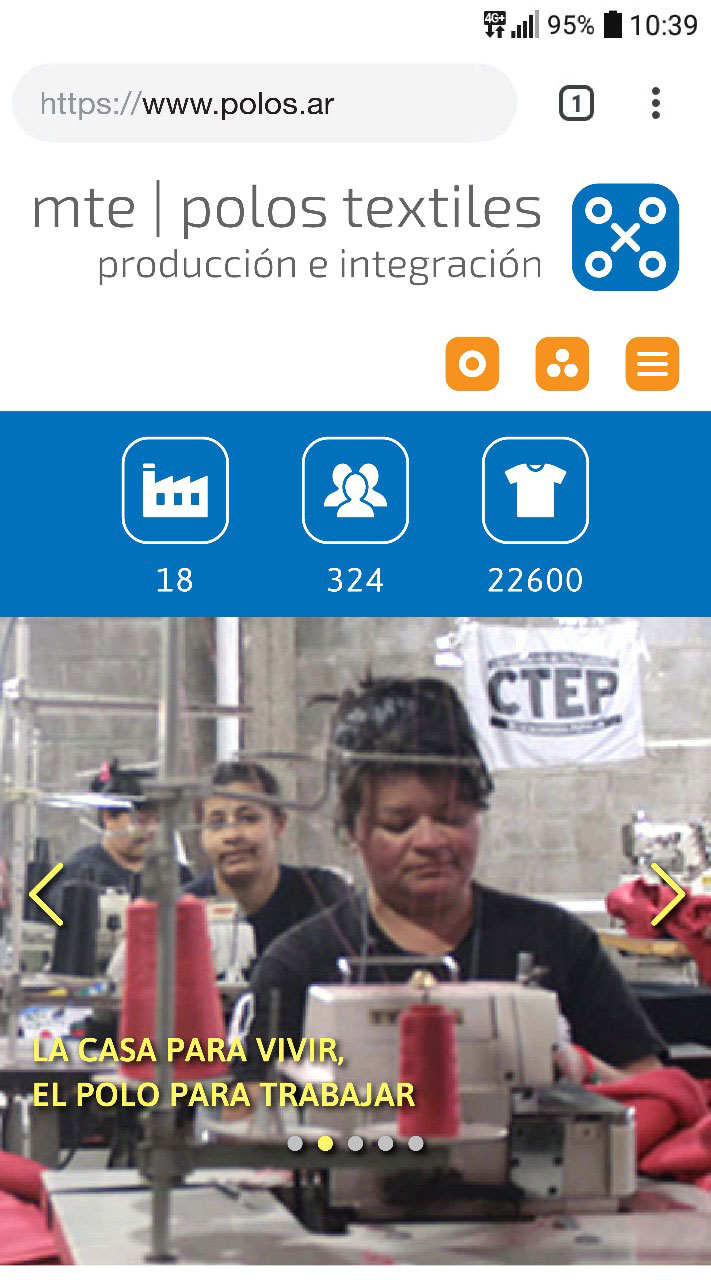
Home of the mobile app for the Polos Textiles network. Image by LTT.
The laboratory resumes its methodology in self learning and invention. Here self-learning means a collective process weaving between reflection and innovation. Self-learning is knowledge production directly from the resolution of concrete problems. The laboratory doesn’t believe in neither imposing nor applying technical solutions from above, or the transferring of outside techniques to the field problem.
We need to convert concrete problems into scenarios of social and political transformation where people and their knowledge have equal rights and collective resolution. The laboratory is a continuous process to slow down, not accelerate, social dynamics to find out the potentials and situations, the matter which enables us to create new collective worlds. Not to project our present into the future but to push the future to our present.
It is at the fringes of the exclusion where the most urgent but also the most sophisticated and subtle problems arise. It is about livelihood, yes, but which collective is not on the verge of questioning its proper existence under the current challenges of the political and ecological crisis we all are immersed in?
We cannot rely anymore on the scenarios shaped by authorization of the experts and the formal education of the public space. The emergency is urgent, unpredictable. That’s why all the contingencies of the underclass, of those living in the fringes of marginalization and exclusion, not only the unemployed, but the destitute, the migrants and refugees are not a new historical subject declared by the academy but those who redefine themselves by making up their life support systems on a daily basis, developing strategies that go beyond survival and create new worlds.
Perhaps we must force experts of different domains from states and corporations to live in the same conditions they govern. Consultancy firms and traders living in a slum? Politicians and bankers sending their kids to marginalized educational facilities? To be included into exclusion.
Evictions, mass redundancies, managed decline, precariousness, postdocs positions, jobs, capacitation, employability. The whole education and work training systems are the material support of this precariousness. Employability means a process of lifelong learning and training that guarantees instability. This continuous transformation is the condition of our precarious condition, a convergence in real time fueled by state and corporations. This is where the institutional takes a crucial role in its arbitration of confrontation: to avoid collective awareness of the ongoing process. But there are no predictable transformations, this is a hint at the present condition. Precariousness is therefore a condition of any collective nowadays, adaptation to dis-adaptation, against the formalization of the creative class. Against this idea of a disruptive future that embodies neoliberalism, collectives like the MTE are proposing a revolution in slow motion. At the laboratory we call this paraformal.
Self building strategies are not the last resource of the precarious urban poor as experts would say. They are an opportunity for the disenfranchised and displaced to take into their own hands the matter of how to inhabit a specific territory. It is not the last chance of survival. It is an experience in the making that goes beyond the individual response. How to build life support systems is a collective process. This is the deep meaning of the challenging question of Have you built your own house? that popular urbanism uses to confront urban experts.
The “Laboratorio de Tecnología y Territorio” is a contested forum in continuous transformation, working out a scenario in permanent development. It is composed of several groups of people and individuals which vary regarding political circumstances. The laboratory is a process which weaves between reflection and experimentation trying to slow down territorial processes to find out among them, the potentials and situations from which to create new collective worlds.
“Popular” investigation enables knowledge to become universal by delivering operative models that seem appropriate not only to deal with contingencies of the excluded, but with the interests of many across a broad field of spatial production. If construction as a feature of the urgencies of the excluded means a revolution in slow motion it is because the adaptive scheme of the creative class, relying on permanent disruption, is postponing what they promise to deliver. The always expected but never yet to come. Architects are active agents of these promises.
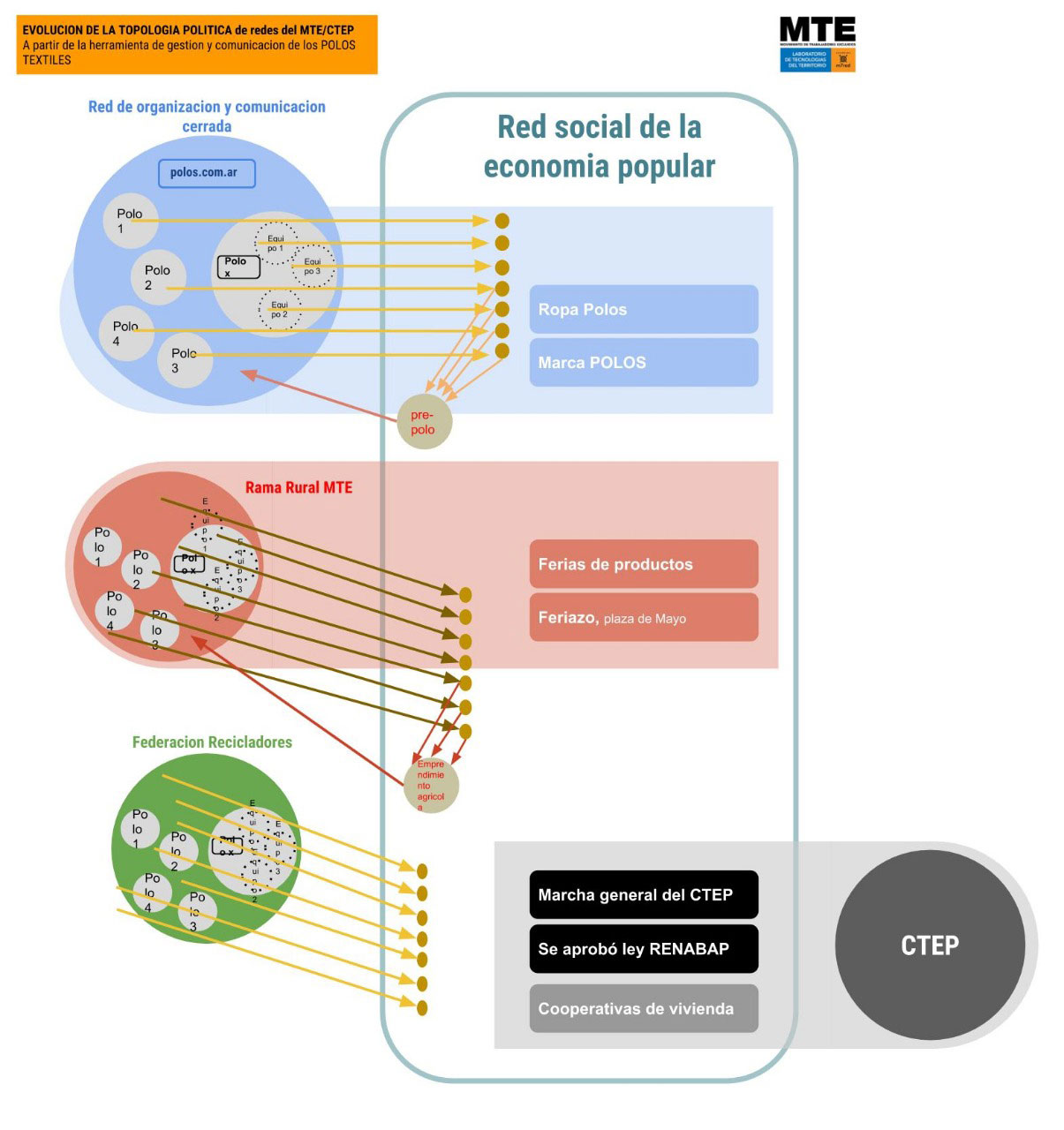
Topological scheme for a social network app to coordinate all the branches of the popular economy. Image by LTT.
The lab weaves between popular investigation – the building up of collective problems and their frameworks – and collective innovation, the resolution of everyday concrete problems. But these resolutions are building a corpus of popular knowledge, an encyclopedia that by systematizing the solutions to complex urban problems from the perspective of those affected, enables the organizations to build up political strength. Organizations like the MTE have to face huge challenges in order to make their claims visible in the hard jungle of political agendas. When they are not blocking roads or assembling in the streets, they are walking down the aisles of the national congress to negotiate laws with representatives. Because they are the silent aim of many technical and academic agendas that want to tame them, or simply to ignore them to privilege expert’s opinions. This is a tremendous pressure to shape the problems from outside. Technological “transfers” from academics or top down assessment by consultancy firms are some of the tools used to ignore their capacities. When experts show up to help organizations they are in fact colonizing these autonomous practices and underlining the main epistemological obstacle: legal recognition of their knowledge production by bureaucrats at top levels of government. “We don’t need architects or planners, we can build ourselves our neighborhoods” was the defiant statement of one of the MTE founders when faced by urban planners and academics. Thinking of this, at the lab, we designed a badge system, like the one used at the innovation ecosystem of the open source movement. This badge system will give any participant, in a problem taken by the organization, a badge that will testimony his/her capacity apprehended in the resolution of a specific problem. These badges will be collected along every problem or knowledge situation the collective has to go through. This open badge system will certify the capacities of those that went along a collective process of knowledge production. The “territorial technical” arises as the outcome of these rural and urban emergent reorganization processes that are happening in slow motion. South American big metropolitan areas are complex territories shaped by changing settlement patterns product of economic, security and climate crisis. To recognize these patterns is a goal for the lab, but to implement a knowledge system from the bottom to the top derived from this multiscale territorial organization, its main task.
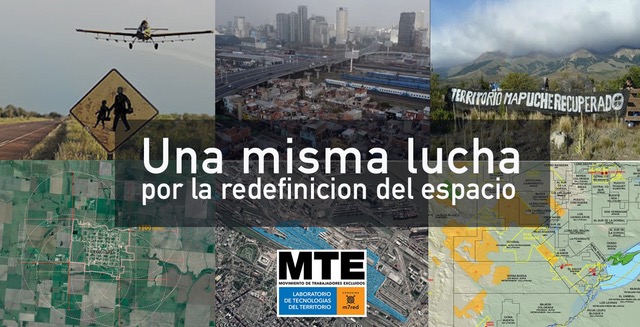
“One same fight for the redefinition of space”, poster for the LTT presentation at Making Futures, Haus der Statistik, Berlin 2019. Image by LTT.
This text has previously been published in August 2019, now edited and republished for Urgent Pedagogies.
are architects working and living in Buenos Aires, Argentina. Both studied architecture and urbanism at the FADU-UBA (Argentina) in the late eighties. From 1999 till 2004 they were founders and members of “m777”, an architect’s collective working on the fringes of the professional field. In 2005 they founded m7red.
is an independent research network and activist group focused on building tools and methodologies for the description of complex scenarios and empowering people to deal with changes and developments in public space. M7red works closely with citizens, particularly marginalised groups disproportionately impacted by spatial injustice. From 2009 to 2014, m7red took part in a hacker-space making open data platforms to tackle environmental problems like the polluted Matanzas Riachuelo river basin. In 2016 they published Mil cuencas, an e-book about its research on Buenos Aires river basins. Between 2016 – 18, together with Forensic Architecture, m7red took part in a collaborative investigation about “Sandra”, the first captive orangutan to be granted non-human rights at the Buenos Aires Zoo. In 2018 m7red set up the Laboratory for Territorial Technologies to accompany an excluded workers’ union (MTE) in the Buenos Aires metropolitan area. M7red has developed projects and collaborations with Jeanne van Heeswijk, raumlabor – berlin, Estudio Teddy Cruz, Transit Labour, Tomas Saraceno and Forensic Architecture. Its works have been exhibited at the Mercosul Biennial in Porto Alegre (Brazil), The APAP project 2010 in Seoul (ROK), the 3d. Design Biennale at Istanbul (Turkey) and at Iaspis in Stockholm in 2018. Since 2019, m7red has been a contributor to The Funambulist Magazine and in 2020 they received the Prince Claus Award on architecture.
m7red website: http://m7red.net
